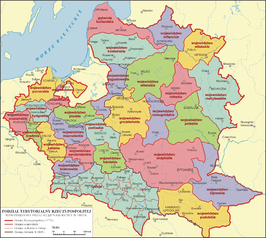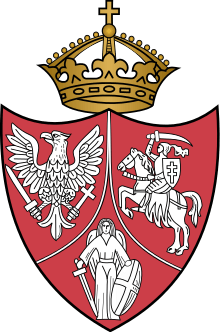Polish National Government (January Uprising)
| Polish-Lithuanian-Ruthenian Commonwealth (January Uprising) Rzeczpospolita Trojga Narodów (Powstanie styczniowe) | |||||||||
|---|---|---|---|---|---|---|---|---|---|
| 1863–1865 | |||||||||
 Claimed borders of the Polish–Lithuanian–Ruthenian Commonwealth during the January Uprising | |||||||||
| Capital |
Warsaw Vilnius Kiev | ||||||||
| Common languages |
Polish Old Belarusian Ruthenian Lithuanian | ||||||||
| Religion |
Roman Catholic Church Belarusian Greek Catholic Church Ruthenian Catholic Church | ||||||||
| Government | Shadow government | ||||||||
| Leader of the Uprising | |||||||||
| Reds | |||||||||
| Legislature | Sejm | ||||||||
| History | |||||||||
• January Uprising | January 22 1863 | ||||||||
• Disestablished | 1865 | ||||||||
| |||||||||
The Polish National Government 1863–64 was an underground Polish supreme authority during the January Uprising, a large scale insurrection during the Russian partition of the former territories of the Polish–Lithuanian Commonwealth. It had a collegial form, resided in Warsaw and was headed by Karol Majewski. This was a normal administrative institution with many ministries and departments.[1]
During 1863–1864 it was a real shadow government supported by the majority of Poles who even paid taxes for it, and a significant problem for the Russian secret police (Okhrana). "It organized one of the world's earliest campaigns of urban guerrilla warfare", according to Norman Davies. It became the prototype for the Polish Secret State during World War II.[2]
References
- ↑ Davies 2005, p. 261.
- ↑ Davies 2005, pp. 260–261.
- Aleksander Waszkowski (1841-1865) President of the Polish National Government (April 1864 - Arrested Dec 1864), executed 1865
- Davies, Norman (2005). God's playground: a history of Poland. 2. Oxford [u.a.]: Oxford University Press. ISBN 9780199253401.
.svg.png)
